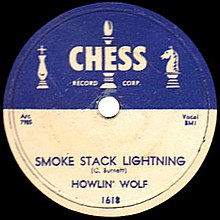Smokestack Lightning
| "Smoke Stack Lightning" | ||||
|---|---|---|---|---|
 |
||||
| Single by Howlin' Wolf | ||||
| B-side | "You Can't Be Beat" | |||
| Released | March 1956 | |||
| Format | 7-inch 45 rpm, 10-inch 78 rpm | |||
| Recorded | Chicago, January 1956 | |||
| Genre | Blues | |||
| Length | 2:32 | |||
| Label | Chess (no. 1618) | |||
| Writer(s) | Chester Burnett a.k.a. Howlin' Wolf | |||
| Producer(s) | Leonard Chess, Phil Chess, Willie Dixon | |||
| Howlin' Wolf singles chronology | ||||
|
||||
"Smokestack Lightning" (also "Smoke Stack Lightning" or "Smokestack Lightnin'") is a blues song recorded by Howlin' Wolf in 1956. It became one of his most popular and influential songs. It is based on earlier blues songs, and numerous artists later interpreted it.
Wolf had performed "Smokestack Lightning" in one form or another at least by the early 1930s, when he was performing with Charley Patton in small Delta communities. The song, called "a hypnotic one-chord drone piece", draws on earlier blues, such as Tommy Johnson's "Big Road Blues" (1928, Victor 21279), the Mississippi Sheiks' "Stop and Listen Blues" (1930, OKeh 8807), and Charley Patton's "Moon Going Down" (1930, Paramount 13014). Wolf said the song was inspired by watching trains in the night: "We used to sit out in the country and see the trains go by, watch the sparks come out of the smokestack. That was smokestack lightning." In 1951, he recorded the song as "Crying at Daybreak". It contains the line "O-oh smokestack lightnin', shinin', just like gold, oh don't you hear me cryin'", similar to the Mississippi Sheiks' lyric "A-ah, smokestack lightnin', that bell shine just like gold, now don't you hear me talkin'".
In Chicago in January 1956, Howlin' Wolf recorded "Smokestack Lightning". The song takes the form of "a propulsive, one-chord vamp, nominally in E major but with the flatted blue notes that make it sound like E minor", and lyrically it is "a pastiche of ancient blues lines and train references, timeless and evocative". Longtime Wolf guitarist Hubert Sumlin is credited with the distinctive guitar line. Howlin' Wolf sang and played harmonica, backed by pianist Hosea Lee Kennard, guitarists Willie Johnson and Hubert Sumlin, bassist Willie Dixon, and drummer Earl Phillips.
In 1956, "Smokestack Lightning" reached number 11 in the Billboard R&B chart. When it was released by Pye International Records in the UK in 1964, it peaked at number 42 in the singles chart. It was later included on the albums Moanin' in the Moonlight and The Howlin' Wolf Album.
...
Wikipedia
